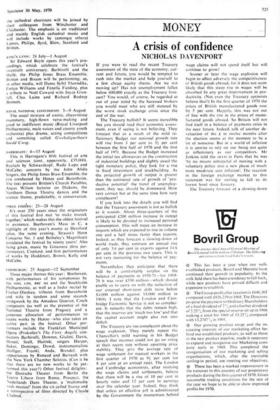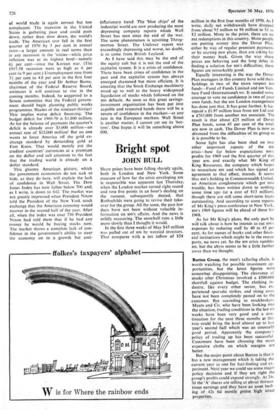MONEY A crisis of confidence
NICHOLAS DAVENPORT
If you were to read the recent Treasury assessment of the state of the economy, cur- rent and future, you would be tempted to
rush into the market and help yourself to a few cheap equity shares. Are we not
moving up? Has not unemployment fallen below 600,000 exactly as the Treasury fore- cast? You would, of course, be regarded as out of your mind by the harassed brokers you would meet who are still stunned by the worst stock exchange crisis since the end of the war.
The Treasury bullish? It seems incredible but you should read their economic assess- ment, even if seeing is not believing. They forecast that as a result of the mild re- flationary Budget our national growth rate will rise from 3 per cent to 31 per cent between the first half of 1970 and the first half of 1971. Because the Budget increased the initial tax allowances on the construction of industrial buildings and slightly eased the tight monetary policy, they look for a rise in fixed investment and stockbuilding. As the projected growth of output is greater than the estimated rate of growth of 'pro- ductive potential' the trend of unemploy- ment, they say, should be downward. How very correct but at the same time how very complacent!
If you look into the details you will find that the Treasury assessment is not as bullish as it sounds. About three-quarters of the anticipated £200 million increase in output is likely to be devoted to increased personal consumption. This will mean an increase in imports which are expected to rise in volume one and a half times faster than exports. Indeed, as they forecast a slowing-down of world trade, they estimate an annual rise of only 3.6 per cent in exports against 14.6 per cent in the previous two years. This is not very reassuring for the balance of pay- ments.
Nevertheless they anticipate that there will be a comfortable surplus on the balance of payments in 1970-71—for 1969- 70 it was over £550 million—which should enable us to carry on with the reduction of our external short-term debt (now below $4,000 million against 58.000 million in 1969). I note that the London and Cam- bridge Economic Service is not so complac- ent. It remarks that the debts remain high, that the reserves are 'much too low' and that the capital account might also run into deficit.
The Treasury are too complacent about the wage explosion. They merely repeat the Chancellor's mild warning in his Budget speech that incomes could not go on rising at their recent rate without upsetting price stability. They give the average rate of wage settlement for manual workers in the first quarter of 1970 as 91 per cent (or 8 per cent at an annual rate). The London and Cambridge economists, after studying the wage claims and settlements, believe that there will be a rise of 10 per cent in hourly rates and 12 per cent in earnings over the calendar year. Indeed, they think that unless an effective jolt is administered by the Government the momentum behind wage claims will not spend itself but will continue to grow!
Sooner or later the wage explosion will begin to affect adversely the competitiveness of British goods abroad, for it does not seem likely that this steep rise in wages will be absorbed by any great improvement in pro- ductivity. (Not even the Treasury optimists believe that!) In the first quarter of 1970 the prices of British manufactured goods rose by 5 per cent. Happily, this was not out of line with the rise in the prices of manu- factured goods abroad. So Britain will not find itself in a balance of payments crisis in the near future. Indeed, talk of another de- valuation of the £ in twelve months after the election seems at the moment to be a lot of nonsense. But in a world of inflation it is unwise to rely on our being not quite as inflationary as our competitors. Mr Jenkins told the OECD in Paris that he was 'by no means unhopeful of moving with a voluntary policy into a new phase of much more moderate cost inflation'. The reaction in the foreign exchange market to this statement was for sterling to fall to its lowest level since January.
The Treasury forecast of a slowing-down of world trade is again correct but too complacent. The recession in the United
States is gathering pace and could push down, rather than slow down, the world's trade. The American GNP fell in the first quarter of 1970 by 3 per cent in annual rates—a larger amount in real terms than in any recession in the 'sixties—while price inflation was at its highest level—namely 61 per cent—since the Korean war. (The 1957-58 recession went as high as 6 per
cent to 9 per cent.) Unemployment rose from 31 per cent to 4.8 per cent in the first four months of the year and Dr Arthur Burns, chairman of the Federal Reserve Board, estimates it will continue to rise in the coming months. Indeed, he suggested to a Senate committee that the Federal govern- ment should begin planning public works programmes. Shades of the nineteen-thirties!
This implies worse deficit financing. The budget deficit for 1969-70 is $1,800 million.
As for the balance of payments the quarter's deficit is already over $3,000 million—an annual rate of $12,000 million! But no one wants to force America off the gold ex- change standard by demanding gold at Fort Knox. That would merely put the creditor countries' currencies at a premium on the dollar and call attention to the fact that the trading world is already on a dollar standard.
This gloomy American picture, which the government economists do not seek to hide, as they do here, will explain the lack of confidence in Wall Street. The Dow Jones Index has now fallen below 700 and, as I write, is down to 642. The market was not greatly impressed when President Nixon told the President of the New York stock exchange that the American economy would recover in the second half of the year. After all, when the index was over 730 President
Nixon had told them that if he had any money he would be buying stocks now. The market shows a complete lack of con- fidence in the government's ability to steer the economy on to a growth but anti-
ffolkes's taxpayers' alphabet
W is for Where the rainbow ends
inflationary trend. The 'blue chips' of the industrial world are now producing the most depressing company reports which Wall Street has seen since the end of the war. The same phenomenon is upsetting Throg- morton Street. The Unilever report was exceedingly depressing and worse, no doubt, is to come from British Leyland.
As I have said this may be the end of the equity cult but it is not the end of the capitalist system. It is a crisis of confidence. There have been crises of confidence in the past and the capitalist system has always emerged chastened but more efficient. It is amazing that the Stock Exchange machinery stood up so well to the heavy widespread liquidation of stocks which followed on the los debacle. As soon as this great savings- investment organisation has been put into capable and respected hands there will be a return of confidence in the markets—at any rate in the European markets. Wall Street is another matter. I cannot yet see its 'bot- tom'. One hopes it will be something above 600.



































 Previous page
Previous page